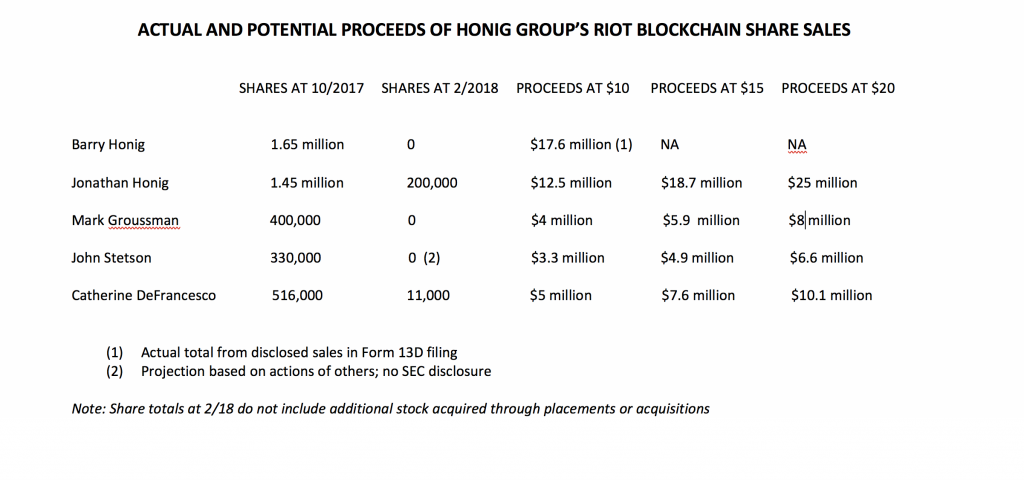EDITOR'S NOTE: The following is an excerpt of part two of an investigation into financier Barry Honig and several associated parties. It was originally published on Sharesleuth.com and is republished here with permission. For the full investigation, click here. For Part one, click here.
Jim McNair and Kevin O’Connor contributed to this report
When financier Barry C. Honig was waging a proxy fight for control of the company that became Riot Blockchain Inc. RIOT, he demanded that it return excess capital to shareholders through a special dividend.
But once Honig and his allies took over in March 2017, they did exactly the opposite. The Colorado-based company, then known as Bioptix Inc., raised an additional $7 million last spring through two private placements. Honig, his business partners, and other associates bought nearly all of the stock, warrants and convertible notes sold in those deals, which were priced at a 30 percent discount to the market.
By the second week of October, they had turned those securities into 4.7 million common shares. That stock, combined with earlier purchases, gave them nearly two-thirds of the company, on a fully diluted basis.
Only then did Riot Blockchain pay the special dividend, distributing $1 per share or share equivalent, or a little less than $10 million. And in the six weeks that followed, the company’s stock price nearly tripled, as deals with two bitcoin-related businesses in which Honig and his associates had undisclosed stakes attracted investors who were seeking cryptocurrency plays. When Riot Blockchain’s stock hit $24 on the day after Thanksgiving, the shares issued through the April placement were worth more than $100 million.
A Securities and Exchange Commission filing from April shows that Honig sold nearly all of his Riot Blockchain shares in October and November, collecting more than $17 million. He failed to promptly report those sales, as required under SEC rules for non-passive investors who own 5 percent or more of a company’s stock.
Our investigation found that three Honig associates – his brother, Jonathan Honig, and longtime partners Mark E. Groussman and John R. Stetson – likely sold more than $20 million of Riot Blockchain stock from October to January. Its shares peaked at $46.20 in December, then came crashing back to earth. They now trade for less than $4. The company is dangerously low on cash and the SEC is conducting a formal investigation.

Riot Blockchain stock sales chart
As Sharesleuth reported in July, it appears that the group’s activities at Riot Blockchain, PolarityTE Inc. PTE, (formerly COOL) and Marathon Patent Group Inc. MARA were part of a broader web of questionable dealings.
On Sept. 7, the SEC brought fraud charges against Barry Honig, Groussman, Stetson and 17 others individuals and entities, including John R. O’Rourke III, another longtime associate who was chairman and chief executive of Riot Blockchain.
The SEC alleged that the defendants participated in so-called “pump and dump” schemes at three other companies:
– BioZone Pharmaceuticals Inc., now Cocrystal Pharma Inc. COCP
– MGT Capital Investments Inc. MGTI
– Mabvax Therapeutics Holdings Inc. MBVX
According to the SEC’s complaint, those schemes generated more than $27 million.
Stetson was, until Sept. 7, executive vice president and chief investment officer of PolarityTE, a Utah-based biotech company whose predecessor was headed by Honig. Our investigation found that the Honig group’s actions at PolarityTE and before that, Majesco Entertainment Inc., mirrored their moves at Riot Blockchain, right down to private placement-and-special dividend maneuver.
The SEC also brought charges against Dr. Phillip Frost, the billionaire chairman and chief executive of Opko Health Inc. OPK, and against Opko itself. It alleged that Frost and Opko were part of an undisclosed “control group” at BioZone and Mabvax, and that they either participated in the group’s wrongful activities or aided and abetted them.
Our analysis of SEC filings showed that Honig and Frost sold more than $20 million of their PolarityTE stock between February 2017 and February 2018, with most of those sales coming in the second half of last year.
Once again, Honig failed to promptly report his sales, as required under SEC rules.

Honig PTE Sales Analysis
PolarityTE’s stock rose sharply this spring, going from $18.13 a share at the start of April to a high of $41.22 in late June. During that period, the company raised $88 million in new capital through a pair of stock offerings.
At its peak, PolarityTE had a market capitalization of almost $900 million. The company’s stock has since fallen by almost half, closing at $21.12 on Sept. 25.
PolarityTE’s most recent proxy filing shows that Honig, Frost, Groussman, Stetson and another defendant in the SEC case – Michael H. Brauser – controlled as many as 4.95 million shares as of mid-August.
That stock would have had a market value of $126 million at the time. Even with the decline in the company’s share over the past few months, PolarityTE has the potential to be the Honig group’s biggest score – one that was years in the making.
To continue reading Sharesleuth's investigation, click here.
(Editor’s note: Chris Carey, editor of Sharesleuth.com, does not invest in individual stocks and has no position in any of the companies mentioned in this report. Mark Cuban, owners of Sharesleuth.com, has short positions in the shares of PolarityTE and Opko.)
© 2025 Benzinga.com. Benzinga does not provide investment advice. All rights reserved.
Trade confidently with insights and alerts from analyst ratings, free reports and breaking news that affects the stocks you care about.